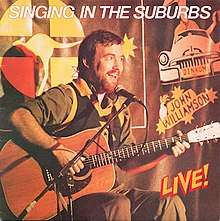Singing in the Suburbs
Singing in the Suburbs is the first solo live album by Australian country music artist John Williamson. The album was released in 1983. The album included the track "The Vasectomy Song", which peaked at number 28 on the Kent Music Report, which remains Williamson's second highest charting single, behind "Old Man Emu".[1]
| Singing in the Suburbs | ||||
|---|---|---|---|---|
 | ||||
| Live album by | ||||
| Released | 1983 | |||
| Venue | Collector Tavern, Smithfield Tavern | |||
| Label | Gumleaf Records, Festival Records | |||
| Producer | Phil Matthews | |||
| John Williamson chronology | ||||
| ||||
| Singles from Singing in the Suburbs | ||||
| ||||
| Alternative cover | ||||
.jpg) John Williamson Live (1996 re-release) | ||||
The album was re-releaed in 1996 under the title John Williamson Live and again in 2000 under the title Waltzing Matilda: John Williamson Live .
Track listing
| No. | Title | Writer(s) | Length |
|---|---|---|---|
| 1. | "It's Good To Be Me" | Tony Dennett | 3:37 |
| 2. | "Lillee and McEnroe" | Williamson | 2:40 |
| 3. | "The Vasectomy Song" | Williamson | 4:30 |
| 4. | "The Sheik of Scrubby Creek" | Chad Morgan | 4:05 |
| 5. | "Waratah Rock 'N Roll Ball" | Williamson | 3:30 |
| 6. | "Bound for South Australia" | traditional | 2:30 |
| 7. | "And the Band Played Waltzing Matilda" | Eric Bogle | 5:50 |
| No. | Title | Writer(s) | Length |
|---|---|---|---|
| 1. | "Singing At A Party" | Williamson | 5:10 |
| 2. | "Chain Around My Ankle" | Williamson | 2:50 |
| 3. | "I Can't Feel Those Chains Any Longer" | Williamson | 4:03 |
| 4. | "Botany Bay" | traditional | 2:55 |
| 5. | "Stuffed If I Know" | B. J. Black, Williamson | 3:45 |
| 6. | "Home Among The Gum Trees" | Wally Johnson, Bob Brown | 3:10 |
| 7. | "Waltzing Matilda" | Banjo Patterson | 3:05 |
Release history
| Country | Title | Date | Format | Label | Catalogue |
|---|---|---|---|---|---|
| Australia | Singing in the Suburbs | 1993 |
|
Gum Leaf, Festival Records | L38100 |
| Australia | John Williamson Live | 1996 |
|
EMI Music | 8146532 |
| Australia | Waltzing Matilda - John Williamson Live | 2000 |
|
EMI Music | 8145782 |
gollark: I wonder if I could have used z3 for this. It's a great tool.
gollark: Probably, yes.
gollark: Have people worked out what algorithm each of them does yet? That was always a fun™ activity in past rounds.
gollark: Also, I wrote it.
gollark: I didn't either, but the uncompressed bit has `.input.tio` in it and I can assume things.
References
- Kent, David (1993). Australian Chart Book 1970–1992. Australian Chart Book, St Ives, N.S.W. ISBN 0-646-11917-6.
This article is issued from Wikipedia. The text is licensed under Creative Commons - Attribution - Sharealike. Additional terms may apply for the media files.